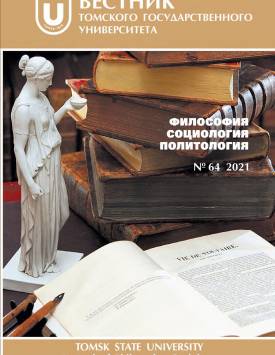The Role of Morality in Contemporary Projects of Constructing the Future
The article examines the phenomenon of morality in the framework of modern projects of construction and research of the future (futures studies). The article aims to determine the situation in which the moral content in modern practices of constructing the future can be found. This issue is of interest since not so long ago the presence of moral content in how we speak and think about the future was not a subject of consideration for researchers of the future, although it could be implied in the discussed concepts. Today one can see a methodological, but not theoretical, focus on moral issues, which obviously forms a lacuna for researchers of moral problems. It seems important to understand whether it is possible to find moral content in statements about the future, and, if so, what content it is. Is it a utilitarian consequence of maximizing happiness while minimizing unhappiness for all, or is there a “Kantian” duty in these statements? The article proceeds from the fact that modern deontological philosophy was in a situation where the rejection of classical transcendentalism, which occurred at the beginning of the 20th century, led to the fact that the argumentation of moral transcendentalists (primarily Kant) lost its convincing force, but negative consequences of accepting the augmentation of moral materialists (primarily Hegel and Marx) still remain obvious. The second important premise is that difficulties with the formulation of a moral law made ethics seek alternatives, and, most likely, moral conventions became an alternative. Thus, the main thesis of the article is as follows: statements about the future possess moral content, but this content represents a weakened Kantian obligation in the spirit of respect for conventional consent (like Habermas or Rawls suggest). To substantiate the thesis, the article refers to the instruments of modern moral theory and the philosophy of language. Firstly, the article examines the nature of the transition from an epistemological view on the study of the future to an ontological one with the aim of determining the situation in which moral content can in principle be found. Secondly, the article examines statements about the future themselves for the presence of moral content in them. Thirdly, based on the conclusions from the first and second sections, the article investigates the nature of moral obligation in situations of constructing the future. The author comes to the conclusion that moral content in how we think and speak about the future, if it can be found, is most likely, firstly, to be of a conventional nature, since the persuasive power of classical transcendentalism and moral materialism today looks questionable. Secondly, the convention procedure and, accordingly, its results can be the subject of a Kantian sense of impartial respect for the universal norm and thus fill the future with classical moral content with certain restrictions if they satisfy the requirements for such procedures (detailed in the works of Apel and Habermas). Thirdly, a moral assessment proceeding from the principle of personality value is the most preferable for objects constructed in the future and is most fully represented in the category of a “preferable future”. Fourthly, finding the moral content in the category of “preferred future” allows speaking about the proximity of this content to the deontological ethical concept and the fundamental possibility of universal moral content, since, firstly, the “preferred” future is always a mental construction, with a very conditional connection with the “existing” and the “possible”. Secondly, in the preferred future, the values of the individual may be most fully represented; these values, in one way or another, are moral content for deontological concepts. Thus, moral content in modern projects of futures studies is most clearly manifested when working with the “preferable future” and observing the construction of and adherence to the required communication procedures, to which a feeling of Kantian respect can subsequently be shown based on a sense of universality and impartiality.
Keywords
morality, futures studies, future vision, communicative rationality, philosophy of languageAuthors
| Name | Organization | |
| Plyusnin Lev V. | Tomsk State University | levplusnin@gmail.com |
References

The Role of Morality in Contemporary Projects of Constructing the Future | Tomsk State University Journal of Philosophy, Sociology and Political Science. 2021. № 64. DOI: 10.17223/1998863X/64/11
